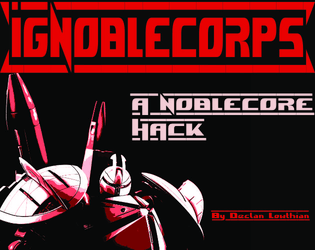Play game
IGNOBLECORPS: PILOTS OF COMMAND's itch.io pageResults
| Criteria | Rank | Score* | Raw Score |
| Fun Factor | #58 | 2.214 | 3.500 |
| Audio (Does not apply for Physical Games) | #60 | 1.581 | 2.500 |
| Overall | #64 | 2.214 | 3.500 |
| Visuals | #69 | 2.055 | 3.250 |
| Originality | #70 | 1.739 | 2.750 |
Ranked from 4 ratings. Score is adjusted from raw score by the median number of ratings per game in the jam.
Is your game a video game or a physical game?
Physical Game
Was your game made solo or in a team?
Solo, though the game is a hack of NOBLECORE by Eric Faber (AirborneHam on itch.io)
Did you use any third party assets, if yes what assets did you use?
Photographs from Joe Green, Pascal Bernardon, Emile Guillemot, Yuyeung Lau, wu yi, Alex Iby, and Xu Haiwei, all via unsplash.
Leave a comment
Log in with itch.io to leave a comment.




Comments
A wide variety of ranks, functions, equipment are given for you to outfit your Mechanized Second Self (mech). The breadth helps you imagine what kind of technology Command has, but there is a lot of space in between, suggesting players could/should create their own as well.
The Mandates and Directives are thematically interesting and challenge. Like Force Blade Punk, getting what (Command) wants will often leave you getting hurt or feeling ashamed. Don’t get what Command wants, and you’ll be dishonorably discharged or slain in the field. However, you can build your character in a certain way that gels with Command’s interests - for example, a pilot whose compunction is “Always be sure where your bullets will land” and Spark is “Earn commendations that contribute to your retirement” will have no problem fulfilling Command’s directive to “Never leave any survivors”.
The meat of the game is in succeeding or failing in Mandates and Directives. There are also triumphs and failures in combat, but most of the narrative mechanics revolve around your relationship with Command. I think it would be interesting to play this game with dedicated roleplayers who are playing very different characters, and see how the campaign evolves. Does the squadron break apart over questions of morality and authority? Or do they bond in battle, and leverage their success to somehow push Command’s ruthlessness towards pragmatic cooperation?
This game asks difficult questions, and does not make it easy for the players to achieve the answers its looking for; this reflects a brutal truth about its subject - professional soldiers - and reminded me of the questions posed in the video essay “Lies of Heroism”.
Due to the main mechanics being about the narrative arc of the characters, playing this game meaningfully would require the GM and players invest some effort in fleshing out their world and what questions they want to ask. Essentially a moral thread, the whole canvas of the game would have to be created by the players with careful attention towards each other’s safe boundaries and their shared vision.
Small yet bulky. This is my initial reaction to this book, some parts I personally would change or homerule into more slick or simplified game, some assets doesn’t really feel right in basically a dark mode pdf, playing as not so good guys is a great idea, yet after finishing my game, seeing command and GM separate is little bit confusing, but it is just me, there are some room for improvement, and yet it is not bad, might playtest down the line
I'm a sucker for RPGs about bad jobs. Some of the text borrowed from Noblecore makes less sense now that the tone has changed from Lensman to Catch-22, but it's not a huge problem and could be easily fixed.